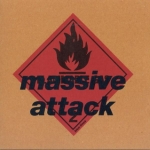First article, I think, celebrating the 25 years of the release of Massive Attack's Blue Lines, masterpiece of an album and source of many moments of happiness for thousands of people over the two and something decades...
Here is the link:
https://blueblueneonglow.wordpress.com/2016/03/19/massive-attack-blue-lines-25-years-on/
And some beautiful and relevant extracts:

As a collection its greatest strength is the way that it blends the multiple voices of the collective into a distinctive British outlook without losing coherence. The obvious reference here is the “English upbringing, background Caribbean” line in the title track, echoed in the ‘Subbuteo and Studio One’ couplet from “Five Man Army” but there are many lines in that loose jostling for position on the microphone that reflect the unique mix of decaying urban paranoia and joy that was Bristol in the late 80s. This is an album that could only be British – listen again and you are instantly back there on City Road the yellow sodium street lights reflecting in the puddles on the cobbles outside of the Moon Club, in the windows of the death trap kebab shop near the Tropic Club or on the one way system near the Western Star Domino Club.
Jazz musicians absorb multiple influences and styles, internally processing them to forge something new and different when they play – Massive Attack pulled off something similar yet more extraordinary here. Rather than just synthesize the joy of the wonderful music, clubs and parties of late 80s city life they somehow captured the whole environment. So “Blue Lines” channels that gauntlet of suspicion and mistrust that had to be run to get to the gigs, places outside of the ‘heritage rock’, pastel coloured woolen jumpers and stripey shirts that constituted mainstream culture in the immediate post Live Aid era.
(...)
It is that intense collective solidarity, looking to stand alongside friends and family against what a mostly hostile world throws your way that stands out today. Our society has been atomised into individual screen shaped cocoons – bought off with cheap disposable consumer goods, while successive governments ceded the ability to collect tax from a self-appointed elite. In 1991 “Safe From Harm” sounded pessimistic, defensive, its propulsive Billy Cobham sample belying the lyric of holding onto your loved ones being the best that we could do – in 2016 it sounds proportionate, positively the best possible outcome of some grim options.
Music this focused and passionate is difficult to make. The painter Frank Auerbach is said to build his finished works through painting over many versions of the same subject – travelling multiple routes through the material, digesting the possibilities with each a rehearsal for the one where he knows it is complete. Rather than the stoned laziness of legend, Massive Attack have always sounded like they have much in common with this approach. When they let an album out into the world it feels as if it has been argued over, every rhythm pattern debated to death, every possibility explored. While the results usually justify the approach, it’s a creative process that has clearly taken its toll on the collective. Shara Nelson the voice of the much celebrated hit singles “Unfinished Sympathy” and “Safe From Harm” was first to leave after “Blue Lines”, followed by Tricky after its follow up “Protection”.
(...)
But without that intensity it is arguable that Massive Attack would not have been such an example of how to make credible modern music. Unlike more timid contemporaries, they have given a platform to organisations like Human Rights campaigners Reprieve without embarrassing themselves or boring their audience. It is this consistent, human, world view that serves as a reminder of a time when bands were prepared to articulate beliefs that went beyond buying an expensive car and ostentatious jewelry. The return of Massive Attack this year is something to anticipate, savour and celebrate – but let’s not forget where the story started.
No comments:
Post a Comment